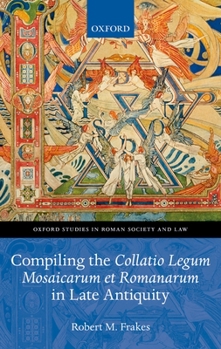Compiling the Collatio Legum Mosaicarum Et Romanarum in Late Antiquity
The expansion of Christianity and the codification of Roman law are two of the most significant facets of late antiquity. The Collatio Legum Mosaicarum et Romanarum, or Collation of the Laws of Moses and the Romans, is one of the most perplexing works of late antiquity: a law book compiled at the end of the fourth century by an anonymous editor who wanted to show the similarity between laws of the Hebrew Bible, or Old Testament, and Roman law. Citing first laws from the Hebrew Bible - especially from Exodus, Leviticus, and Deuteronomy which he believed were written by Moses - the anonymous Collator then compared corresponding passages from Roman jurists and from Roman laws to form discussions on sixteen topics such as homicide, adultery, homosexuality, incest, and cruelty towards slaves. While earlier scholars wrestled with dating the Collatio, the religious identity of the Collator, and the purpose of the work, this book suggests that the Collator was a Christian lawyer writing in the last years of the fourth century in an attempt to draw pagan lawyers to seeing the connections between the law of a monotheistic God and traditional Roman law. Frakes's volume presents a five-chapter historical study of the Collatio with a revised Latin text, new English translation, and a historical and juristic commentary.
Format:Hardcover
Language:English
ISBN:0199589402
ISBN13:9780199589401
Release Date:January 2012
Publisher:Oxford University Press, USA
Length:384 Pages
Weight:1.27 lbs.
Dimensions:1.1" x 5.7" x 8.6"
Customer Reviews
0 rating





